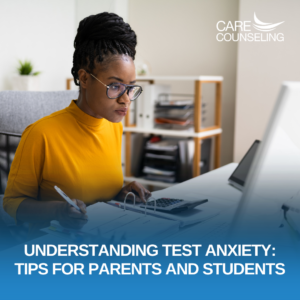Understanding Test Anxiety
 As students progress through their academic journey, they encounter various tests and exams that can trigger feelings of stress and anxiety. Test anxiety is a common experience that can hinder a student’s performance and overall well-being. As parents and educators, it is essential to understand test anxiety and provide the necessary support to help students overcome it.
As students progress through their academic journey, they encounter various tests and exams that can trigger feelings of stress and anxiety. Test anxiety is a common experience that can hinder a student’s performance and overall well-being. As parents and educators, it is essential to understand test anxiety and provide the necessary support to help students overcome it.
What is Test Anxiety?
Test anxiety is a form of performance anxiety that occurs when students feel excessively stressed or nervous before or during an examination. It can manifest in physical symptoms, such as a rapid heartbeat, sweaty palms, or a racing mind, which may hinder a student’s ability to concentrate and recall information during the test.
Understanding the Signs of Test Anxiety:
Recognizing the signs of test anxiety is the first step in addressing the issue effectively. Some common signs of test anxiety in students include:
- Physical symptoms: Headaches, stomachaches, sweating, trembling, or shortness of breath.
- Cognitive symptoms: Racing thoughts, difficulty focusing, or going blank during the test.
- Emotional symptoms: Feelings of fear, worry, irritability, or hopelessness.
- Behavioral symptoms: Avoidance of studying or tests, procrastination, or restlessness.
Tips for Parents:
- Create a Supportive Environment:
Establish a supportive and non-judgmental environment at home where your child feels comfortable discussing their feelings about tests and academic pressure. Show empathy and reassure them that it is normal to feel anxious before exams.
- Encourage Effective Study Habits:
Help your child develop effective study habits, such as creating a study schedule, using study aids like flashcards or practice tests, and taking regular breaks during study sessions. Effective preparation can boost their confidence and reduce anxiety.
- Manage Expectations:
Encourage your child to do their best rather than placing undue pressure on achieving perfect scores. Remind them that test scores do not define their worth, and mistakes are opportunities for learning and growth.
- Teach Relaxation Techniques:
Teach your child relaxation techniques, such as deep breathing, progressive muscle relaxation, or mindfulness exercises. These techniques can be invaluable tools for managing anxiety during tests.
Tips for Students:
- Prepare and Practice:
Be proactive in your test preparation. Review the material regularly, engage in active learning techniques, and take practice tests to simulate exam conditions. Familiarity with the content can boost your confidence and reduce anxiety.
- Stay Positive:
Challenge negative thoughts and self-doubt. Replace negative statements with positive affirmations and visualize yourself successfully completing the test.
- Get Enough Sleep:
Ensure you get enough rest the night before the test. A well-rested mind is better equipped to handle stress and recall information.
- Arrive Early:
On the day of the test, arrive early to the testing location. This will give you time to settle in, relax, and mentally prepare.
Test anxiety is a common challenge faced by many students, but it can be effectively managed with the right support and strategies. As parents, creating a supportive environment and encouraging effective study habits can significantly help your child cope with test anxiety. For students, proactive preparation, positive thinking, and relaxation techniques are valuable tools to overcome anxiety and perform well in exams. Remember, test scores do not define your worth, and it’s essential to prioritize your well-being alongside academic success. With understanding and support, students can face tests with confidence and achieve their full potential.



























